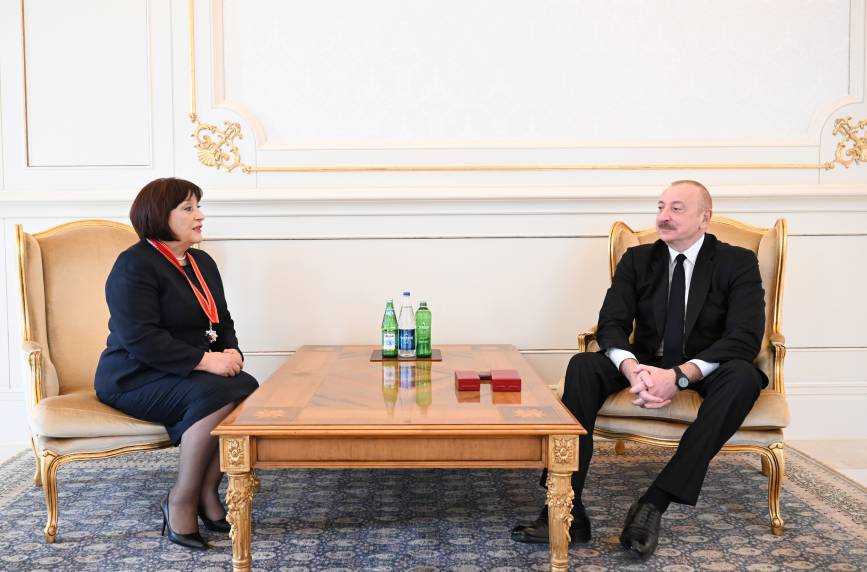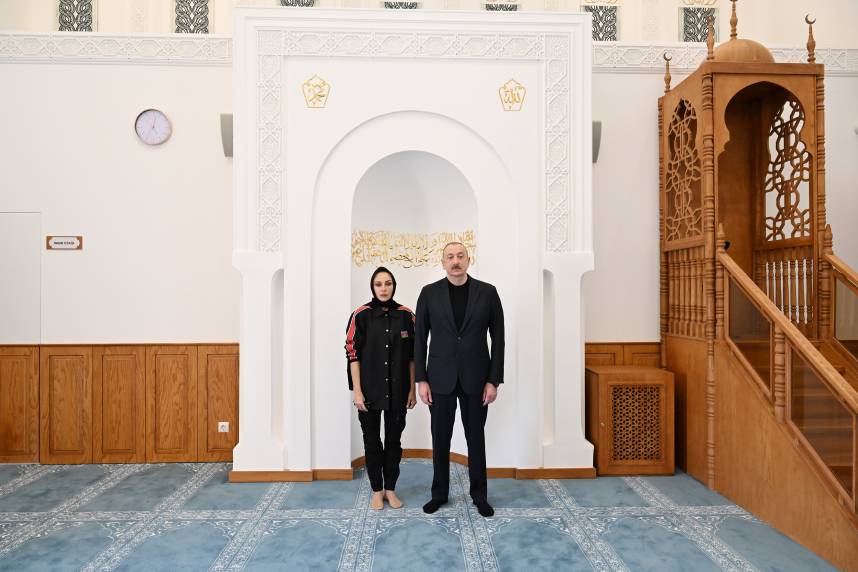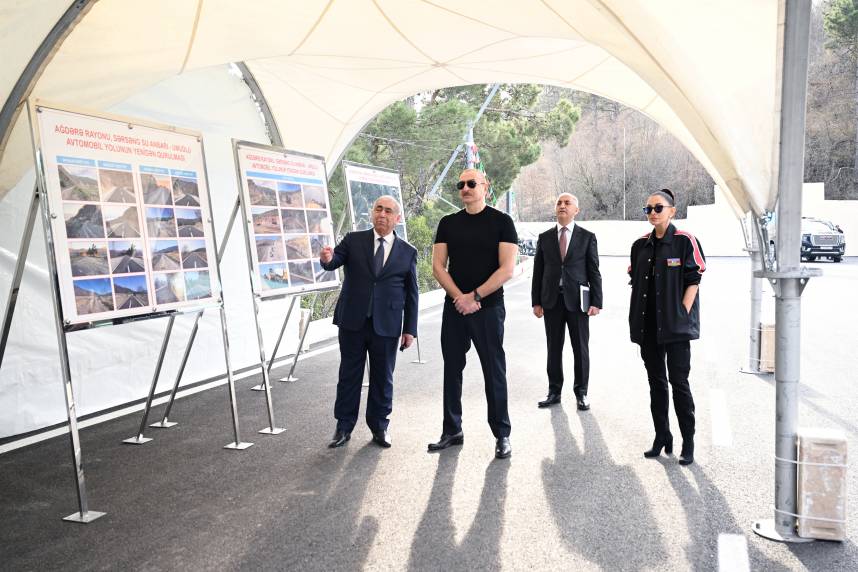13:09
Руководствуясь пунктами 3 и 32 статьи 109 Конституции Азербайджанской Республики, в целях ускорения развития искусственного интеллекта в...
19 марта 2025, 13:09Today’s zaman
Sunday, 26 February 2012
The chief of the department of political analysis and information of the Presidential Administration of Azerbaijan, Elnur Aslanov said in an interview with Sunday's Zaman on Tuesday that the Khojaly massacre was a deliberate mass slaughter committed by the Armenian Armed Forces on Feb. 26, 1992.
“The Khojaly massacre is a deliberate mass slaughter of Azerbaijanis committed by Armenians. It is a criminal act committed purposefully by the Armenian leadership, which leaves no doubt that it constitutes a genocide,” says Aslanov, adding that the international community should not turn a blind eye on the intentionally killed innocent Azerbaijani civilians in Khojaly.
Khojaly is a town in Nagorno-Karabakh, a region over which a war was fought between Armenia and Azerbaijan in 1988-1994, leaving 30,000 dead and nearly a million displaced. Since then, negotiations to resolve the Nagorno-Karabakh conflict have been continuing under the Organization for Security and Cooperation in Europe (OSCE) Minsk Group, established in 1992. However, the talks have yet to yield any results. Although there is a cease-fire agreement between the two conflicting sides, there are still border skirmishes that claim dozens of lives.
Feb. 26, 1992, is one of the most traumatic dates in history for Azerbaijanis. In the early hours of that fateful day in 1992, the Armenian Armed Forces, commanded by current Armenian President Serzh Sarksyan, wiped out the city of Khojaly with the support of Russia’s 366th armored battalion.
During the interview, Aslanov elaborated on the issue of the Khojaly massacre and bilateral relations between Turkey and Azerbaijan.
Could you please assess the bilateral relations between Turkey and Azerbaijan? How can brotherhood and national interests be reconciled when building healthy bilateral relations?
Relations between Turkey and Azerbaijan are based on historical, cultural and brotherly relations. The ties between the two countries have been strong throughout history. In recent years, however, the two countries have experienced difficulties. At the same time, the two countries, Turkey and Azerbaijan, have their own national interests based on their own security concerns, geo-economics and geopolitical positions. However, when the national interests of two nations overlap, they become binding factors through the frank and constructive dialogue between both nations’ senior officials, mainly between Azerbaijani President Ilham Aliyev and Turkish President Abdullah Gül and Turkish Prime Minister Recep Tayyip Erdoğan. The foreign policy priorities of Azerbaijan and Turkey are based on universal principles and aim at achieving development in a globalizing world. Our national characters and sympathy for each other make it easier to select a single strategic option that suits both nations. Both objective and subjective factors weigh in when balancing the national interests of the two nations. On multilateral platforms, representatives of both states always support each other and share a common position on different issues. Each step that is taken by Azerbaijan is seen to stimulate and strengthen Turkey’s regional and international position. In the same vein, Turkey’s policy positions on international issues strengthen Azerbaijan’s influence in international matters.
Azerbaijan calls Turkey its brother country. However, some circles in Turkey consider Azerbaijan a burden on Turkey, claiming that Azerbaijan does not support Turkey when necessary. What is your take on that? Who do you think these forces are?
The positions and approaches of people are different. There could be people who do not like us, and this is normal and natural. Undoubtedly, there are forces in both countries that view the brotherhood between the two nations with envy and want to sever these ties. They express their concerns in different ways and there is no need to be surprised over their views. Turkey and Azerbaijan are dynamic and developing countries. We are the states who possess democratic values and create opportunities for all citizens to express themselves freely. If we look through the dynamics of development of relations between Turkey and Azerbaijan, we can witness once more that these groups are in the wrong about not only Azerbaijan’s but also Turkey’s policy outlook. Regardless of these groups, we have the ability to support each other at difficult times. We will never allow anyone to damage these relations.
What kind of contribution will the Trans-Anadolu gas pipeline project, agreed on by Turkey and Azerbaijan, make to economic cooperation and the strategic alliance between the two states?
Azerbaijan is historically well-known for its oil and gas resources and was one of the first oil-exporting countries in the world. Oil from the Absheron peninsula [in Caspian Sea] in medieval times was transported to neighboring countries as well as to the Ottoman Empire. Today, Azerbaijan wields significant influence over the regional political dynamics as an oil-exporting country. The large oil and gas reserves of Azerbaijan make the country the main actor in the region as it provides Europe with diverse energy sources and supply routes.
The agreement on the Trans-Anadolu gas pipeline signed between Azerbaijan and Turkey increased both states’ significance in the sphere of oil and gas transport and underlined their role in bridging East and West. The agreement on the Trans-Anadolu gas pipeline is being implemented as part of the energetic strategy of both states. The State Oil Company of the Azerbaijan Republic (SOCAR), the main actor of the project, holds 80 percent of the shares in the project; the rest belongs to the state-owned Turkish Pipeline Corporation (BOTAŞ) and the Turkish Petroleum Corporation (TPAO).
As Turkey’s gas pipelines were unable to transmit more than 10 billion cubic meters of gas, this project will help Azerbaijani gas transfers both to Turkish and European markets. The Trans-Anadolu will transport 16 billion cubic meters of gas at first, but it is possible that this volume will be increased at a later stage. This project will not only enable Turkey to diminish its energy dependency on other countries but will also diversify the energy sources of the country. Moreover, the project will be a new source of energy supply for the South Stream pipeline project supported by the European Union. Furthermore, we have the Baku-Tbilisi-Ceyhan (BTC) and the Baku-Tbilisi-Erzurum (BTE) oil-gas pipelines to help boost bilateral relations between the two states.
There is one more project between Azerbaijan and Turkey, which is the Baku-Tbilisi-Kars (BTK) railway project. This project has real potential in turning the region into the hub of transportation. Another important point is the historical agreement of strategic partnership signed to establish a High-Level Strategic Cooperation Council (HLCC) between Turkey and Azerbaijan on Aug. 16, 2010. By this decree, new strategic areas were added to the political and economic relations, which are constantly evolving. The HLCC is a good example of close cooperation in the field of security between the two states. Generally, at the start of the 21st century, the relations between Turkey and Azerbaijan entered a new phase and the HLCC is a good indicator of the trust and confidence between the two states.
There were several notable problems, such as Baku’s concerns on Turkish-Armenian rapprochement between Turkey and Azerbaijan in 2008-2009 after Turkey and Armenia launched a process of reconciliation between the two nations. Was it related to the lack of communication between the two states?
Communication between the two states is improving. Problems can be solved only by negotiations and dialogue between officials from both countries, and so holding regular discussions between the states is very important. Turkey closed the border with Armenia after Kalbajar, one of the occupied territories in Azerbaijan, was occupied by the Armenian Armed Forces. Turkey closed its borders because the aggression by Armenia violated international law and norms. Turkey objected to the Armenian aggression. This was not only an act against Armenian brutality but also an indication of its support to Azerbaijan in trying to force Armenia to obey its international commitments.
Despite all these efforts, Armenia still continues its aggression and Nagorno-Karabakh and seven adjacent territories remain occupied. The international community turns a blind eye to Armenian aggression, which in fact emboldens Armenia to continue its aggression and illegal actions. Recently, Armenian President Serzh Sarksyan told Armenian youth, “We got Nagorno-Karabakh; you [the Armenian youth] should get Aghri back [from Turkey].” This claim inspires violence, threatens stability and can lead to war in the region. All these violent and illegal actions should be a lesson to the international community. They need to change their position towards Armenia and push the country to make peace with both Azerbaijan and Turkey.
Prime Minister Erdoğan, on several occasions, noted that the Turkish-Armenian border would not be opened until the Nagorno-Karabakh war finds its peaceful solution, showing his and Turkey’s support to Azerbaijan. Moreover, the international community should know that Armenian leaders trapped themselves in difficult situation through their aggressive regional policy. Armenia cannot benefit from regional projects and the poor living conditions in Armenia force Armenians to leave the country. Even Charles Aznavour, a famous singer of Armenian origin, blamed Armenia of “massacring Armenians.” The key lies with the Armenian leaders. They must give up on their territorial claims and join regional integration based on peace and friendship.
In your opinion, does Azerbaijan need to follow the lobbying in Turkey? At the same time, how are Turkey and Azerbaijan cooperating in discrediting Armenians’ deliberate defamation and deception?
Of course, there is a need to introduce Azerbaijan and its truth to Turks as well. Today, a new generation is growing up in Turkey. They have to understand the reasons for the closure of the border between Armenia and Turkey and they have to be informed about the Armenian aggression towards Azerbaijan. Azerbaijan has a dynamic economy. Regional projects are being realized because Azerbaijan either initiated and/or supports them. The Azerbaijani government implemented plenty of reforms in the sphere of state structure. Despite the fact that only a period of time has passed since Azerbaijan regained its independence, a lot has been achieved. The Turks have to be informed about all this in time. And of course the Azerbaijani youth have to be extensively informed about Turkey as well.
A rally will be staged today at İstanbul’s Taksim Square to commemorate the fact that it has been 20 years since the Khojaly massacre. We would like to know your opinion about the rally? Why is Turkey the stage for the biggest rally commemorating the Khojaly massacre in the world?
As I was informed, the rally is going to be organized by both Azerbaijani and Turkish students. The rally will be an expression of a very well-known phrase: one nation, two states. This rally is going to be a symbol of solidarity of people raising their voice against Armenian lies. Of course, Turkey is not a random choice as the location for the rally.
Azerbaijani students are scattered across the world to study, but the majority of them are studying in Turkey. Moreover, various organizations and associations from different parts of the world are going to join the rally.
The rally is going to be staged in order to commemorate the 20th anniversary of the Khojaly massacre. The event is called the Caucasus’s Srebrenica [referring to the town of Srebrenica in Bosnia and Herzegovina where in 1995 more than 8,000 Bosnian Muslims where killed by Serb soldiers under the command of Gen. Ratko Mladic] and it was a deliberate mass slaughter of Azerbaijanis committed by Armenians. Khojaly predates Srebrenica and Rwanda. It is a criminal act committed purposefully by the Armenian leadership, which leaves no doubt that it constituted genocide.
With this rally, Azerbaijanis and Turks want to raise the awareness of the international community about the hate crime Armenians committed against Azerbaijanis nearly two decades ago. To commit genocide was an integral part of the strategy of the war Armenia started in 1988. In the 1988-1994 period of the Nagorno-Karabakh war, Armenians used the same unbelievable methods and tactics that Nazis used against innocent people during World War II.
British journalist Thomas de Waal in his book “Black Garden: Armenia and Azerbaijan Through Peace and War” quoted Armenian President Sarksyan, who was the commander of the Armenian Armed Forces in 1992, as saying: “Before Khojaly, Azerbaijanis thought that they were joking with us, they thought that the Armenians were people who could not raise their hand against the civilian population. We were able to break that stereotype. And that’s what happened.”
This once more confirms that Armenians have to answer for both the aggression and the massacre of innocent Azerbaijanis.
ELNUR ASLANOV
Elnur Aslanov is a chief of Political Analysis and Information Provision Department of Administration of the President of the Republic of Azerbaijan. Aslanov previously worked as an assistant to the Head of Administration of the Azerbaijani President. Moreover, Aslanov was also a senior consultant at the Presidential Administration and consultant at the Department of Foreign Relations and for the work with political parties of Central Apparatus of New Azerbaijani Party, country’s ruling party. He received his PhD degree in Political Science.
Link to article
Руководствуясь пунктами 3 и 32 статьи 109 Конституции Азербайджанской Республики, в целях ускорения развития искусственного интеллекта в...
19 марта 2025, 13:09
Руководствуясь пунктом 23 статьи 109 Конституции Азербайджанской Республики, постановляю:
За большие заслуги в...
19 марта 2025, 11:17В 2025 году исполняется 80 лет со дня учреждения высшей научной организации страны – Национальной Академии наук Азербайджана.
Национальная...
18 марта 2025, 18:42Руководствуясь пунктом 23 статьи 109 Конституции Азербайджанской Республики, постановляю:
За отличие при исполнении служебных обязанностей...
18 марта 2025, 17:02Уважаемые соотечественники!
Сердечно поздравляю вас с Новруз байрамы, желаю каждому из вас весеннего настроения, здоровья и успехов.
Священное...
18 марта 2025, 17:00

Уважаемая госпожа Президент,
Глубоко потрясены известием о гибели и ранении большого числа людей в...
17 марта 2025, 15:20Руководствуясь пунктом 23 статьи 109 Конституции Азербайджанской Республики, постановляю:
За многолетнюю...
17 марта 2025, 12:46